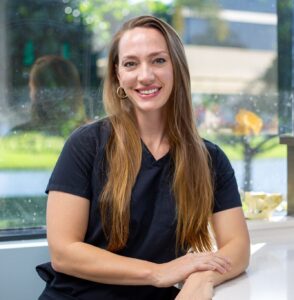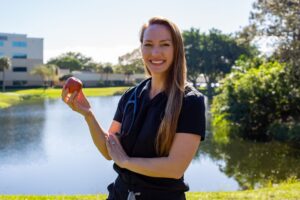PA and Registered Dietitian Colleen Sloan Provides ‘Nutrition Education for Busy Medical Professionals’
‘I want clinicians to feel like talking about nutrition is not only doable but enjoyable’
March 19, 2024
By Jennifer Walker

Colleen Sloan, PA-C, RDN, got the idea for her podcast, Exam Room Nutrition, when she realized that her colleagues were unintentionally giving inaccurate advice about nutrition and weight to her pediatric patients. She was particularly impacted by one patient, 9 years old at the time, who was crying when Sloan came into the exam room. Six months prior, a provider told him he needed to lose weight and that he should weigh less at his next appointment. The child weighed himself every day until this encounter, his next visit, when he found out he had gained three pounds.
“My heart sank for this child,” Sloan said. “He was going through the pre-puberty stages when a lot of times children, especially boys, grow out before they grow up. His body was doing exactly what it was supposed to do. But that small, flippant comment—and again the clinician probably meant no harm—affected the child so much that he was weighing himself and probably eating less foods, and he was to the point where he was crying and upset with himself because he didn’t lose weight.”
Sloan—who was a registered dietitian before becoming a PA—spent 15 minutes with the patient, educating him about his growing body and providing a few steps he could take for his health that didn’t include monitoring his weight. Sloan wanted him to focus on eating foods that fuel his body—foods that help him feel strong and run fast and do well in school—and getting in movement for fun, such as riding his bike.
[For more information on nutrition, check out AAPA’s Nutrition Toolkit]
 It was during this visit that Sloan realized her background in both dietetics and medicine meant that she could offer a valuable perspective to other clinicians. As a dietitian, she wants her patients to be educated about core nutrition principles and how to set achievable goals to make lifestyle changes. But as a PA, she knows how it feels to get a nutrition question during a busy clinic day, which can be overwhelming for clinicians who don’t have a nutrition background or confidence in how to respond and are already pressed for time.
It was during this visit that Sloan realized her background in both dietetics and medicine meant that she could offer a valuable perspective to other clinicians. As a dietitian, she wants her patients to be educated about core nutrition principles and how to set achievable goals to make lifestyle changes. But as a PA, she knows how it feels to get a nutrition question during a busy clinic day, which can be overwhelming for clinicians who don’t have a nutrition background or confidence in how to respond and are already pressed for time.
Exam Room Nutrition brings together these two fields. On the show, Sloan interviews registered dietitians from various specialties to answer the nutrition questions that clinicians commonly get in their practices. Her goals are to help other clinicians find the right words to talk about nutrition with their patients and to showcase dietitians as nutrition experts and potential partners in providing care.
“Chronic diseases like diabetes, heart disease, and stroke are the leading causes of death and disability, yet they’re mostly preventable through diet and lifestyle,” Sloan said. “If we can properly educate our providers to educate their patients and refer to dietitians, we can prevent chronic conditions and save our patients’ lives.”
Talking about Nutrition and Weight Loss
 At Pediatric Associates in South Florida, where she has been a practicing PA since 2017, Sloan gets excited to answer her patients’ nutrition questions during their visits for urgent care and annual physicals. These questions range from what formula to feed their infant and when to start solids, to how to address food intolerances and allergies. “I love to teach parents how to have boundaries around meal times and address picky eating, and how to discuss children’s weight, especially if the parent is concerned about them being overweight or underweight,” Sloan said.
At Pediatric Associates in South Florida, where she has been a practicing PA since 2017, Sloan gets excited to answer her patients’ nutrition questions during their visits for urgent care and annual physicals. These questions range from what formula to feed their infant and when to start solids, to how to address food intolerances and allergies. “I love to teach parents how to have boundaries around meal times and address picky eating, and how to discuss children’s weight, especially if the parent is concerned about them being overweight or underweight,” Sloan said.
When it comes to weight loss, providing nutrition education for all ages goes beyond telling patients to eat fewer fried and sugary foods and more fruits and vegetables, then checking their labs a few months later. “That’s very stale,” said Sloan, who has worked as a registered dietitian in many clinical settings, including a trauma ICU, a private practice focused on weight loss and diabetes, and a large pediatric center. “It’s also basic nutrition. I would guarantee the majority of the American population knows what it means to follow a healthy diet. What patients really need help on is the how—the small actions they can take that lead to behavior changes.”

This is why counseling is a crucial component of conversations about nutrition and weight loss. At the beginning of these discussions, Sloan recommends clinicians ask deeper questions to learn why they their patients want to lose weight, such as “What do you want to do that you can’t do now?” Patients might say they are looking forward to playing with their grandchildren without getting tired or feeling confident in shorts after giving birth, or getting off of medications, sleeping better, or having a lower A1C level. “Those goals are what’s going to get the patient to change,” Sloan said.
From there, counseling involves being mindful of the words used when talking about this topic. In pediatrics, Sloan never tells children they need to lose weight. “Children don’t need to be burdened with that,” she said. Instead, she might educate young patients that all foods can fit in to our lives, and some foods have specific roles in the body during certain times. For example, a cookie has fat and sugar, but it can also provide a lot of energy that kids’ muscles will use as fuel if they are playing sports. Sloan has delved further into what to say when having conversations about weight with kids on her podcast.
Exam Room Nutrition also covers the importance of nutrition in addressing many other diseases and conditions. “If you have a patient in front of you struggling with certain conditions, ask about the foods they’re eating,” said Sloan, “So many conditions can be treated with proper nutrition.”
Diving into Exam Room Nutrition
Since launching Exam Room Nutrition in July 2023, Sloan has brought on registered dietitians to talk about nutrition in relation to autism, cardiac conditions, constipation, kidney disease, and migraines, as well as stages of life like pregnancy, motherhood, and midlife.
 Weight loss has been a big topic on Sloan’s show. “Whether you work in pediatrics or endocrinology or cardiology, weight is at the forefront of medical care,” she said. For providers who want to learn more about addressing this topic with their patients, Sloan recommends starting with her ten-part, ongoing solo series, “A Provider’s Guide to Helping Patients Lose Weight.” In this series, she covers questions to ask, going beyond BMI as a marker, ending emotional eating, how to calculate and count macros, traps of goal setting and how to avoid them, and more.
Weight loss has been a big topic on Sloan’s show. “Whether you work in pediatrics or endocrinology or cardiology, weight is at the forefront of medical care,” she said. For providers who want to learn more about addressing this topic with their patients, Sloan recommends starting with her ten-part, ongoing solo series, “A Provider’s Guide to Helping Patients Lose Weight.” In this series, she covers questions to ask, going beyond BMI as a marker, ending emotional eating, how to calculate and count macros, traps of goal setting and how to avoid them, and more.
Although Sloan hopes to give clinicians a place to start when talking about nutrition, she does not expect them to take on the role of registered dietitians. “Clinicians don’t have to know everything about weight loss for their patients, nor do they have the time to address the intricate details of a patient’s dietary habits,” she said. Sloan hopes her show will help clinicians give patients a few items to work on. Then they can refer patients to registered dietitians, who can dive deeper into those suggestions.
This summer, Sloan will continue to highlight registered dietitians on Exam Room Nutrition through a new series called “Ask the Dietitian.” In these episodes, she will host two guests—the registered dietitian and a clinician—with the dietitian answering nutrition questions from the clinician in real time.
Sloan will also continue to emphasize the importance of word choice when talking about nutrition, especially for weight loss. “The way we say things can empower patients or really tear them down,” she said. “The right words, delivered with compassion and true desire to see patients succeed, will make patients feel seen, heard, and valued. When patients feel validated, they will be much more open to our nutrition recommendations.”
Jennifer Walker is a freelance writer in Baltimore, MD. Contact Jennifer at [email protected].
You Might Also Like
TV Host and ‘Wellness Kitchenista’ PA Jessica DeLuise Promotes a Food-as-Medicine Philosophy
PA Martine Altieri Brings an Obesity Medicine Clinic to Her Cardiology Patients
Creating a Safe Space to Discuss Obesity with Patients, Experts Speak
Thank you for reading AAPA’s News Central
You have 2 articles left this month. Create a free account to read more stories, or become a member for more access to exclusive benefits! Already have an account? Log in.



